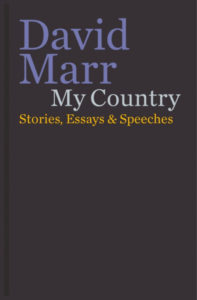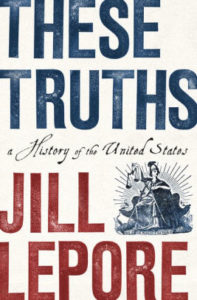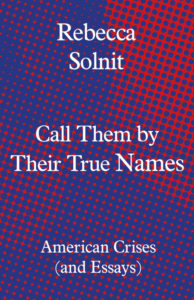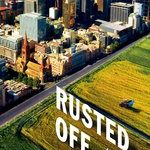This year, Community Colleges Australia (CCA) is pleased to present its first “Summer Reading List”, with selected recommendations for members and friends. Dr Don Perlgut, CEO of CCA, provides the following summer reading guide.
“Summer reading is a sacred pastime. For many of us, it’s about the only time we now have to read without constant distraction.” – Tim Soutphommasane
Understanding Australia
My Country: Stories, Essays & Speeches by David Marr
 David Marr’s My Country: Stories, Essays & Speeches is a massive collection of his writing, from the 1970s onwards, including early works, such as the first review of the Rocky Horror Picture Show. “My country is the subject that interests me most, and I have spent my career trying to untangle its mysteries,” writes Marr. The book is filled with Marr’s wisdom: “The true radicals in Australia are those who call themselves conservative…. Australians are a practical people…. We fight change hard here – often brutally hard – but the leaders we come to admire are mostly reformers.”
David Marr’s My Country: Stories, Essays & Speeches is a massive collection of his writing, from the 1970s onwards, including early works, such as the first review of the Rocky Horror Picture Show. “My country is the subject that interests me most, and I have spent my career trying to untangle its mysteries,” writes Marr. The book is filled with Marr’s wisdom: “The true radicals in Australia are those who call themselves conservative…. Australians are a practical people…. We fight change hard here – often brutally hard – but the leaders we come to admire are mostly reformers.”
I suspect I am not the only person on whom David Marr has grown over the years. Perhaps best-known for his biography of Patrick White, Marr’s work has broadened and deepened in recent years, turning him one of Australia’s most insightful cultural and political commentators. In recent years, Marr has published Quarterly Essay biographies of Tony Abbott, George Pell and Bill Shorten. Listen to Marr’s ABC Radio National “Conversations” interview with Richard Fidler (13 November 2018) for a preview of his book’s contents.
Rusted Off: Why Country Australia is Fed Up by Gabrielle Chan
In this week’s Sydney Morning Herald (29 December 2018), Shane Wright writes: “Capital cities are eating up the rest of Australia. Already home to more than two-thirds of the nation’s 25 million residents, each capital city will soon dominate their respective state or territory in a way that will challenge Australia’s economic and political landscape.” Capital city populations became dominant in 1916 in South Australia, 1921 in Victoria, 1942 in Western Australia, 1954 in New South Wales and 1991 in the Northern Territory. It’s projected to take place in 2027 in Queensland and 2040 in Tasmania. The social, political, economic and cultural implications of this national demographic shift is profound.
It’s also one cause for the political restlessness of non-metropolitan Australia, with increasing numbers of non-major party politicians winning seats such as Cathy McGowan; the further you get from the state GPO, the higher the disillusioned minor party vote.
That’s the context of Gabrielle Chan’s book Rusted Off: Why Country Australia is Fed Up. Born to Chinese immigrants in Sydney, Chan became a journalist and moved to western New South Wales in 1996. She separates the book into 2 parts (“Shedding my city skin” and “The politics of country”) and 19 chapters – which she calls “lessons”. Examples: 1. WTF? There are people west of the divide; 2. Place is everything; 5. There is an education divide; 7. Not all kids want to go to uni; 11. Rural politics is stuck in an old model; 15. The economics of a small town are tricky. Listen to Chan’s interview with Philip Clark on ABC Radio’s “Nightlife”.
Seize the Fire: Three Speeches by Richard Flanagan
Acclaimed novelist Richard Flanagan (The Narrow Road to the Deep North) has begun to develop a reputation as one of Australia’s most insightful speech-makers. This short volume includes three of his recent speeches, encapsulating a unique Australian voice: “Australia is not a fixed entity, a collection of outdated bigotries and reactionary credos, but rather an invitation to dream, and this country—our country—belongs to its dreamers . . . if we are finally to once more go forward as a people it’s time our dreamers were brought in from the cold.”
Understanding America
The United States of America has always fascinated Australia, however during the last two years – since the ascendancy of President Trump – the need to understand what is happening across the Pacific, and it’s meaning for Australia, has become acute. These two works should assist.
These Truths: A History of the United States by Jill Lepore
 This ground-breaking, lengthy and acclaimed historical work by Harvard academic and New Yorker essayist Jill Lepore attempts in one volume to explain the full scope of American history. Writing in The Atlantic, Megan Garber writes: “I can think of no stronger endorsement than this: These Truths is 932 pages long—and, reader, I didn’t want it to end…. Here are some of the most urgent and defining truths of the current moment—among them inequality, partisanship, nationalism, and, in particular, racism—told in reverse, Metacom to Cotton Mather to Andrew Jackson to Frederick Douglass to Pauli Murray to Phyllis Schlafly to Barack Obama … [p]eople who, treading the vast American landscape, bent the arc of history.”
This ground-breaking, lengthy and acclaimed historical work by Harvard academic and New Yorker essayist Jill Lepore attempts in one volume to explain the full scope of American history. Writing in The Atlantic, Megan Garber writes: “I can think of no stronger endorsement than this: These Truths is 932 pages long—and, reader, I didn’t want it to end…. Here are some of the most urgent and defining truths of the current moment—among them inequality, partisanship, nationalism, and, in particular, racism—told in reverse, Metacom to Cotton Mather to Andrew Jackson to Frederick Douglass to Pauli Murray to Phyllis Schlafly to Barack Obama … [p]eople who, treading the vast American landscape, bent the arc of history.”
Companion piece: Janesville: An American Story by Amy Goldstein, a recent visitor to the Sydney Writers Festival; listen to her Festival talk here.
Call Them by Their True Names: American Crises (and Essays) by Rebecca Solnit
 American journalist, historian and environmental activist Rebecca Solnit – author of Men Explain Things to Me, about male arrogance which preceded “mansplaining” – has marked out her place as one of the most original voices on feminism, ecology and the environment and how place matters in the modern age. Her latest collection consists of 20 essays separated into four sections – Electoral Catastrophes, American Emotions, American Edges and Possibilities. The pieces in this collection were all written since 2016 and are thus imbued with a sense of urgency within the shadows of the Trump presidency. Solnit lives in San Francisco, and brings a unique West Coast perspective, compared to the New York-Washington-Boston intellectual approach we are used to.
American journalist, historian and environmental activist Rebecca Solnit – author of Men Explain Things to Me, about male arrogance which preceded “mansplaining” – has marked out her place as one of the most original voices on feminism, ecology and the environment and how place matters in the modern age. Her latest collection consists of 20 essays separated into four sections – Electoral Catastrophes, American Emotions, American Edges and Possibilities. The pieces in this collection were all written since 2016 and are thus imbued with a sense of urgency within the shadows of the Trump presidency. Solnit lives in San Francisco, and brings a unique West Coast perspective, compared to the New York-Washington-Boston intellectual approach we are used to.
Companion piece: Women and Power: A Manifesto by British classicist Mary Beard.
Understanding the Crisis of Neoliberalism
Neoliberalism, with its accompanying marketisation/privatisation agenda, has made a profoundly negative impact on Australian vocational education and training (VET), and – as a result – the community education sector. These three recent books provide arguments against the marketisation agenda and essential reading on what to do next:
Dead Right: How Neoliberalism Ate Itself and What Comes Next by Richard Denniss is a passionate, highly readable essay that shows how “the language, ideas and policies of neoliberalism have transformed our economy and, more importantly, our culture.”
The Wages Crisis in Australia: What it is and what to do about it is a free e-book from University of Adelaide Press, edited by Andrew Stewart, Jim Stanford (a recent speaker to NSW community college CEOs) and Tess Hardy. Read chapter 9, “Contracting out community services, marketisation and wages”, by Fiona Macdonald and Michael Pegg.
Wrong Way: How Privatisation & Economic Reform Backfired, edited by Damien Cahill and Phillip Toner, includes 19 case studies of how marketisation has failed Australia. Read Toner’s chapter entitled “A Tale of Mandarins and Lemons: Creating the Market for Vocational Education and Training”, which I reviewed back in November.
Understanding Economics, Democracy and Politics
And finally, the age of Trump means that more authors are writing passionately about and why democracy should be saved:
- The People vs Democracy: Why Our Freedom is in Danger and How to Save It by Yascha Mounk
- On Tyranny: Twenty Lessons from the Twentieth Century by Timothy Snyder (author of Bloodlands: Europe Between Hitler and Stalin)
- Why Save the Bankers? And Other Essays on Our Economic and Political Crisis by Thomas Piketty. If you couldn’t bear the idea of ploughing through Piketty’s 816 page Capital in the Twenty-First Century, this short book of his articles and essays from 2008 to 2015 may be just the thing to ensure that you understand this seminal French thinker. Piketty “transformed out economic discourse” (Paul Krugman) and is widely credited with being the person who convinced us that rising inequality is a big story.
Other Summer Reading Lists
A number of organisations and people create their summer reading lists. Here are some of my favourites:
Per Capita 2018 Progressive Summer Reading List
Grattan Institute Summer Reading List for the Prime Minister 2018
Barack Obama’s summer reading on his Facebook page






[…] This year, I wrote Community Colleges Australia’s first “Summer Reading List”, with selected recommendations for members and friends. (You can view the CCA version here.) […]